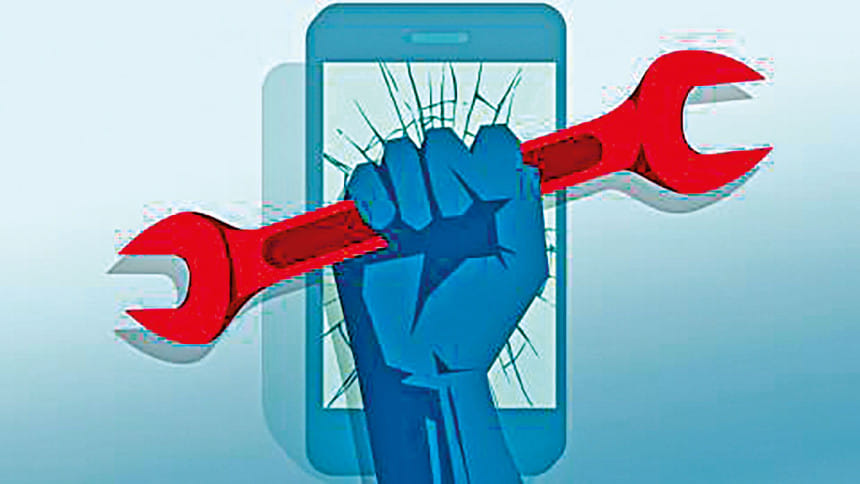The Right to Repair and IP Rights in Bangladesh

Most of the corporations aim to block repair through making new devices such that they are even hard to be repaired by the third-party repairers much less the consumers. For example, it is next to impossible to repair Apple's new iPhone 13 without going to an apple authorised store. The tech corporations choose to exert more control also by making their product obsolesced and slower over time, so that they are forced to buy newer models. This is mostly common in mobile phones and other handy devices. The third way that they choose is authorising only some selected repair shops to have their product, and not making them available at the free market.
However, the problem is that IP rights under national legislation of most of the countries including Bangladesh allow most of these processes of continuing monopoly. The most common IP right that is linked to right to repair (R2R) is that of patent. The companies often, through patenting their spare parts, make it almost impossible for the third-party repairers and consumers to repair a product on their own without breaching the relevant laws. Section 29(1) of the Patents and Designs Act (PDA) of 1911 provides that a patentee may institute suit for infringement in respect of an invention when a person makes, sells or uses the invention without his license, or counterfeits it, or imitates it. As the Act does not provide any scope for national exhaustion, this particular section may bar third parties from selling spare parts of a product without obtaining a license. As a result, the producers are at will to control who sells their product and who is not allowed to do so- ultimately rendering the consumers less options, and at times, making it even impossible to repair a thing by not producing the parts required at all.
Likewise, repair may also cause trademark infringement when the third-party repairers either use the product by procuring it through an unauthorised way or by amending or modifying the trademarked product. Section 26 (5) of the Trademark Act, 2009 comes up with great difficulty for third party repairers as well as the owner of an item. Accordingly, any person may be treated as infringer if that person applies, having known or reason to believe that the application of the mark was not duly authorised by the proprietor or a registered user, a registered trademark to material intended to be used for labeling or packaging goods, or for advertisement purpose. Interpretation of this provision would mean that if a repairer or any person through customisation or repair altered the features of any product in a way that applying the registered mark on that customised or repaired item would not be duly authorised by the proprietor or registered user then such application might cause trademark infringement. Also, this provision would attract use of unauthorised billboards containing registered trademarks by third party repairers for advertisement purposes.
Although the existing IP rights legislation in Bangladesh comes as an obstacle to R2R, the situation is the other way around with the Competition Act, 2012. The Act in its section 15(3)(a) prohibits tie-in arrangement as mostly used by the companies to somewhat compel the consumer to purchase the tied products or services (for example, toolbox or other accessories) only from them and not anyone else. Therefore, use of any condition of purchase requiring a purchaser of goods to buy tied products will breach this provision. To give an example, in an otherwise perfect case, Apple's policy to compel the buyer to buy a dongle to connect it to an earphone jack may easily attract this provision. The Act also prohibits 'exclusive distribution agreement' where the agreement limits, restricts or withholds the output or supply of any goods or allocates any area or market for the disposal or sale of the good (section 15(3) (c)). This appears to be in conflict with section 29(1) of the PDA, 1911 as the PDA, in effect, allows exclusive distribution agreement by providing the patentee right to sue for infringement if a person inter alia, sells or uses the invention without his license. Of note, in such conflict, the result is obvious as section 15 (4) of the Competition Act upholds the supremacy of the intellectual property legislation in this situation on the one and only condition that to restrain infringement of IP rights, only the reasonable conditions may be imposed.
In the light of the foregoing, it transpires that a new legislation is a must.
The writer is intern researcher, A.S. & Associates.

 For all latest news, follow The Daily Star's Google News channel.
For all latest news, follow The Daily Star's Google News channel. 



Comments